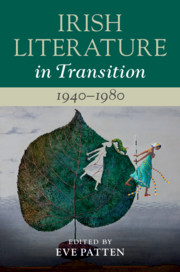Book contents
- Irish Literature in Transition, 1940–1980
- Irish Literature in Transition
- Irish Literature in Transition, 1940–1980
- Copyright page
- Contents
- Contributors
- Series Preface
- General Acknowledgements
- Introduction
- Part I After the War: Ideologies in Transition
- Part II Genres in Transition
- Chapter 5 Intermodernism and the Middlebrow in Irish Writing
- Chapter 6 Transitional Life-Writing: Frank O’Connor and the Autobiographical Tradition
- Chapter 7 ‘Somehow It Is Not the Same’: Irish Theatre and Transition
- Chapter 8 Samuel Beckett, Flann O’Brien and the Literature of Absurdity
- Part III Sex, Politics and Literary Protest
- Part IV Identities and Connections
- Part V Retrospective Frameworks: Criticism in Transition
- Index
Chapter 7 - ‘Somehow It Is Not the Same’: Irish Theatre and Transition
from Part II - Genres in Transition
Published online by Cambridge University Press: 28 February 2020
- Irish Literature in Transition, 1940–1980
- Irish Literature in Transition
- Irish Literature in Transition, 1940–1980
- Copyright page
- Contents
- Contributors
- Series Preface
- General Acknowledgements
- Introduction
- Part I After the War: Ideologies in Transition
- Part II Genres in Transition
- Chapter 5 Intermodernism and the Middlebrow in Irish Writing
- Chapter 6 Transitional Life-Writing: Frank O’Connor and the Autobiographical Tradition
- Chapter 7 ‘Somehow It Is Not the Same’: Irish Theatre and Transition
- Chapter 8 Samuel Beckett, Flann O’Brien and the Literature of Absurdity
- Part III Sex, Politics and Literary Protest
- Part IV Identities and Connections
- Part V Retrospective Frameworks: Criticism in Transition
- Index
Summary
This chapter considers theatre productions in Ireland between the 1950s and 1970s, asserting the continued relevance and sharpness of Irish theatre in relation to social and political transition. Emerging mid-century playwrights such as Tom Kilroy and Brian Friel found themselves at a challenging and uncertain moment in Irish theatre, coming in the wake of the Abbey’s revivalist triumph but exposed too to the experimental movements of European theatre practice. Determined to write against inherited theatrical conventions and the increasing national dependence on a stagnant domestic realism, they looked to forge a new dramatic language adequate to a society in a state of acute and disorienting transition. The Pike Theatre was one of an array of independent theatres that succeeded in staging major avant-garde productions, such as Samuel Beckett’s Waiting for Godot in 1955. Playwrights working more explicitly within inherited naturalistic modes, such as M. J. Molloy, meanwhile, found more subtle means of subverting the spatial conventions of Irish theatre in a way that drew attention to imperative social issues such as mass emigration.
Keywords
- Type
- Chapter
- Information
- Irish Literature in Transition, 1940–1980 , pp. 134 - 149Publisher: Cambridge University PressPrint publication year: 2020

